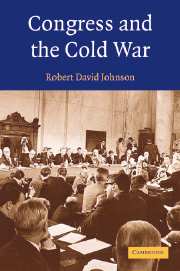Book contents
- Frontmatter
- Contents
- Abbreviations Used in the Text
- Acknowledgments
- Prologue
- Archives Consulted
- Congress and the Cold War
- 1 Constructing a Bipartisan Foreign Policy
- 2 Legislative Power and the Congressional Right
- 3 Redefining Congressional Power
- 4 The Consequences of Vietnam
- 5 The Transformation of Stuart Symington
- 6 The New Internationalists' Congress
- 7 The Triumph of the Armed Services Committee
- Appendix A The Foreign Aid Revolt of 1963
- Appendix B The Senate and U.S. Involvement in Southeast Asia, 1970–1974
- Appendix C The Senate of the New Internationalists, 1973–1976
- Appendix D The House and the End of the Cold War, 1980–1985
- Index
4 - The Consequences of Vietnam
Published online by Cambridge University Press: 05 June 2012
- Frontmatter
- Contents
- Abbreviations Used in the Text
- Acknowledgments
- Prologue
- Archives Consulted
- Congress and the Cold War
- 1 Constructing a Bipartisan Foreign Policy
- 2 Legislative Power and the Congressional Right
- 3 Redefining Congressional Power
- 4 The Consequences of Vietnam
- 5 The Transformation of Stuart Symington
- 6 The New Internationalists' Congress
- 7 The Triumph of the Armed Services Committee
- Appendix A The Foreign Aid Revolt of 1963
- Appendix B The Senate and U.S. Involvement in Southeast Asia, 1970–1974
- Appendix C The Senate of the New Internationalists, 1973–1976
- Appendix D The House and the End of the Cold War, 1980–1985
- Index
Summary
William Macomber, who served in both the Eisenhower and Johnson White Houses, later commented that U.S. military involvement in Vietnam intensified an already existing congressional rebellion against Cold War foreign policy. The opposition to the Vietnam War originated from the same institutional and ideological environment that produced the foreign aid revolt of 1963. Unclear in the early 1960s, however, was whether these dissenters also would support an aggressive congressional role to implement their agenda, thereby repudiating the lesson from the revisionist era that increasing congressional power would facilitate a reactionary foreign policy.
For several years after Dienbienphu, conditions in Vietnam attracted legislative mention largely as part of the broader concern with the foreign aid program, but more senators noticed Southeast Asia during the early 1960s. In June 1961, for example, Albert Gore informed Robert McNamara that based on past practice of previous military aid to Diem, he wondered what “more of the same thing would accomplish.” The next year, Wayne Morse warned Dean Rusk that “the administration's honeymoon in connection with Southeast Asia is about over,” and demanded an “answer to the cumulating evidence that the Government of South Vietnam is not a democratic government.”
These comments reflected a concern that the Kennedy administration, seeing Vietnam as a testing ground for flexible response, was dangerously expanding its military commitment in Southeast Asia.
- Type
- Chapter
- Information
- Congress and the Cold War , pp. 105 - 143Publisher: Cambridge University PressPrint publication year: 2005



